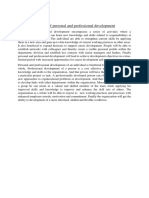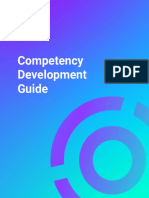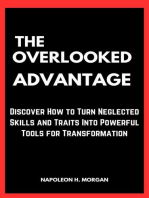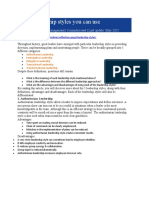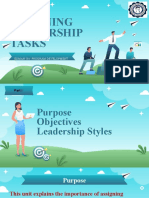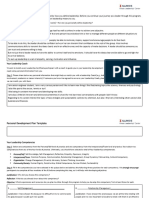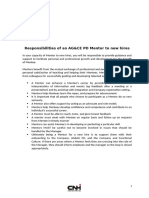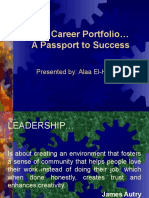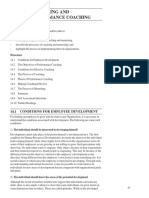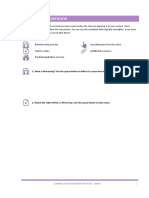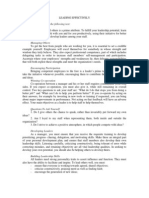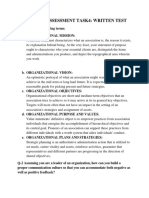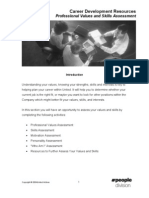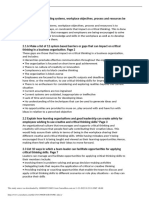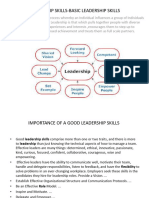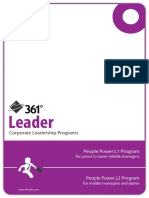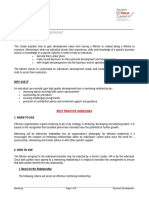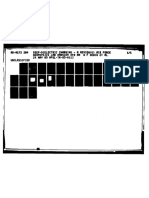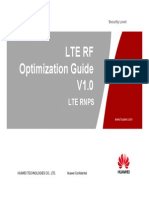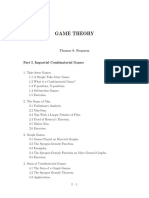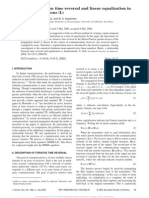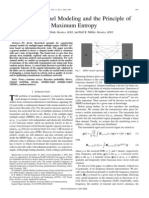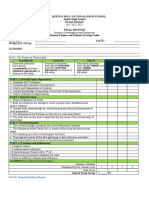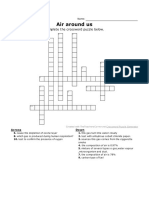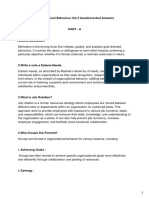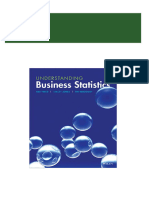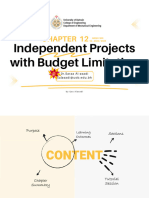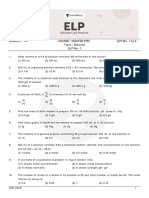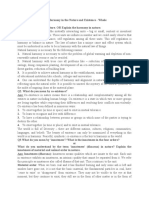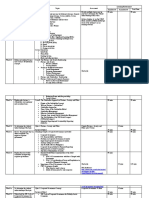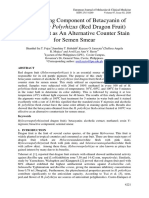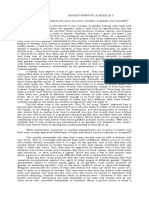We Develop Ourselves and Others
We Develop Ourselves and Others
Uploaded by
Mohamed BGcityCopyright:
Available Formats
We Develop Ourselves and Others
We Develop Ourselves and Others
Uploaded by
Mohamed BGcityOriginal Title
Copyright
Available Formats
Share this document
Did you find this document useful?
Is this content inappropriate?
Copyright:
Available Formats
We Develop Ourselves and Others
We Develop Ourselves and Others
Uploaded by
Mohamed BGcityCopyright:
Available Formats
We develop ourselves and others
1. Introduction
1.1 We develop ourselves and others
Notes:
Welcome to this short module showing how we develop ourselves and others.
1.2 Objectives
Notes:
Published by Articulate® Storyline www.articulate.com
This short module focuses on how we develop ourselves and others.
After completing this module, you will be able to:
• Recognize the Leadership Framework and the 4 leadership standards
• Identify and describe the leadership standard ‘We develop ourselves and
others’
• List the 5 competences under the leadership standard ‘We develop
ourselves and others’
• Know the difference between unskilled, skilled and over-used for each of
the 5 competences.
• List examples of when each competence is unskilled, skilled and over-used
1.3 Video
Notes:
Video will play automatically.
https://nokia.sharepoint.com/portals/hub/_layouts/15/PointPublishing.aspx?app=video&p=p&chid=6cb8cc70-6f9a-
4828-9017-4ac9886e7a8f&vid=5fd7c6df-06e6-49aa-a138-f92ea9f2fd7c&from=1
Published by Articulate® Storyline www.articulate.com
1.4 Value
Notes:
We can clearly see that the leadership framework standards we list as 1. We
know, 2. We lead, 3. We develop, and 4. We shape nicely align with the Nokia
values known as achievement, respect, renewal and challenge.
1.5 We develop
Notes:
You have chosen to focus on how we develop ourselves and others.
Published by Articulate® Storyline www.articulate.com
Developing ourselves and others requires a flair for talent. We dedicate time
to understand what makes people tick, what they consider their motivators,
and their drivers. We grow people, including ourselves, and boost team
performance for the sake of continuous “renewal” which is an important
value for Nokia.
2. Competencies
2.1 Critical competencies for developing ourselves and others
Notes:
The 5 competencies that have been identified as measurable characteristics of a person that
supports that leadership standard “we develop ourselves and others” are the following:
Develops talent, self-development, builds effective teams, directing work, and drives
engagement.
Please click on each one for definitions and examples based on the scale; unskilled, skilled, or
over-used.
During this section, be honest with yourself and consider where you might place yourself on
the scale, and where you may want to initiate a shift.
Published by Articulate® Storyline www.articulate.com
2.2 Markers
Notes:
To be skilled in the competency “Develops talent” a leader would give high priority to
developing others and will do this through coaching, feedback and exposure to stretched
assignments. They would align the employees career development goals with the
organizational objectives and will also encourage people to accept developmental moves.
Be sure to click on the unskilled and over-used examples to understand the full range of this
competency.
____________________
Unskilled:
Doesn’t take time to work on development of others; is a tick-the-box developer; goes
with the easiest option to fulfil talent-development obligations; doesn’t make use of
available organization resources and systems to develop others; has difficulty
identifying developmental moves or assignments.
Over-used skill:
Concentrates on the development of a few at the expense of many; overestimates
people’s capacity for growth; may be too quick to adopt faddish development
approaches.
Published by Articulate® Storyline www.articulate.com
2.3 Markers
Notes:
When it comes to “Self-development” this individual is personally committed and actively works
to continuously improve themselves and will also accept assignments that broaden their
capabilities. They learn from new experiences, from others, and from structured learning, and
make the most of the development resources available to them.
Be sure to click on the unskilled and over-used examples to understand the full range of this
competency.
____________________
Unskilled:
Doesn’t put in the effort to grow and change; is comfortable with current skills; is
fearful of making mistakes that accompany development; lacks awareness of or interest
in using available developmental resources.
Over-used skill:
Develops just for the sake of development, without focus or objective; focuses on own
development at the cost of meeting other obligations; may be susceptible to the latest
self-help fads.
Published by Articulate® Storyline www.articulate.com
2.4 Markers
Notes:
When referring to the competency of “directs work”, it is imperative to provide clear direction
and accountabilities.
The leader shall delegate and distribute assignments and decisions appropriately and monitor
progress by maintaining dialogue on work and results. They will also provide appropriate
guidance and direction based on people’s capabilities and will intervene as needed to remove
obstacles.
Be sure to click on the unskilled and over-used examples to understand the full range of this
competency.
__________________
Unskilled:
Provides incomplete, vague or disorganized instructions; delegates work to people
without giving them sufficient guidance; sets goals and objectives so easy to achieve
that people are demotivated in the process; saves high-profile tasks for oneself.
Over-used skill:
May be overly directive and stifle creativity and initiative; pushes people too hard by
asking them to work at their upper limits; may over-delegate without providing enough
direction or help; gives people authority that they shouldn’t have.
Published by Articulate® Storyline www.articulate.com
2.5 Markers
Notes:
To be skilled in the competency “Builds effective teams” one must be able to form teams with
appropriate and diverse mix of styles, perspectives and experience. They need to be able to
establish common objectives and a shared mindset and create a feeling of belonging and
strong team morale. Sharing wins, rewarding team efforts and fostering an open dialog and
collaboration among the team are also ways someone will demonstrate that they are “skilled in
this competency”.
Be sure to click on the unskilled and over-used examples to understand the full range of this
competency.
____________________
Unskilled:
Doesn’t create a common mindset or common challenge; fails to recognize that morale,
recognition and belongingness are integral ingredients of effective teams; prioritizes
and rewards individual efforts rather than team achievements; doesn’t shape and
distribute assignments in a way that encourages teamwork.
Over-used skill:
May focus so much on team behavior that results may suffer; may build such a strong
sense of team identity that it is hard for new members to break in and get up to speed;
may not develop individual leaders.
Published by Articulate® Storyline www.articulate.com
2.6 Markers
Notes:
If you are skilled in “directs work” it means that you structure the work so it aligns with
people’s goals and motivators. You would empower others and make each person feel that
their contributions are important.
Be sure to click on the unskilled and over-used examples to understand the full range of this
competency.
______________________
Unskilled:
Has little insight into what motivates others; doesn’t give people enough flexibility and
autonomy to do their work; does little to create enthusiasm; is unwilling to share
ownership and give up control of assignments.
Over-used skill:
May accommodate others’ motivators at the cost of getting needed work done; may
empower beyond people’s capacity; may avoid giving constructive feedback if it could
negatively impact on engagement.
Published by Articulate® Storyline www.articulate.com
3. Thank you
3.1 Thank you
Notes:
Thank you for taking the time to complete this short module.
You may revisit the training at any time.
Please follow and complete the curriculum to gain the badge “develop ourselves and others”.
You can download the complete PDF document containing all 20 competencies for future reference.
You may now exit the training.
Published by Articulate® Storyline www.articulate.com
You might also like
- Twelve SkillsDocument7 pagesTwelve SkillsNadinneNo ratings yet
- LEED GA Exam Questions Set 8Document25 pagesLEED GA Exam Questions Set 8CEG BangladeshNo ratings yet
- Building Effective Teams enDocument3 pagesBuilding Effective Teams enLeni ANo ratings yet
- Mine Surveying Gyro Theodolite PDFDocument4 pagesMine Surveying Gyro Theodolite PDFMuhammad Aalam KhanNo ratings yet
- Plan For Personal and Professional DevelopmentDocument11 pagesPlan For Personal and Professional DevelopmentAmila FernandoNo ratings yet
- CDG - Project Manager - Head of PMODocument27 pagesCDG - Project Manager - Head of PMOMilan LjubicicNo ratings yet
- Learninig Module 02Document29 pagesLearninig Module 02Fahmi AbdiNo ratings yet
- Situational Leadership II PDFDocument3 pagesSituational Leadership II PDFAravamudhan SrinivasanNo ratings yet
- The Overlooked Advantage: Discover How to Turn Neglected Skills and Traits Into Powerful Tools for TransformationFrom EverandThe Overlooked Advantage: Discover How to Turn Neglected Skills and Traits Into Powerful Tools for TransformationNo ratings yet
- Leadership StylesDocument145 pagesLeadership StylesMagelyn NBNo ratings yet
- Assigning Leadership Tasks Unit 5Document66 pagesAssigning Leadership Tasks Unit 5Zendy LanzagaritaNo ratings yet
- 10 Leadership QualitiesDocument10 pages10 Leadership Qualitiessonuchandini100% (1)
- (SV) Leadership Styles-1Document9 pages(SV) Leadership Styles-1Yulia BelkaNo ratings yet
- LLCI Legacy-Leadership-Competency-Inventory-Online-Self-Assessment-Sample-ReportDocument19 pagesLLCI Legacy-Leadership-Competency-Inventory-Online-Self-Assessment-Sample-ReportAdam Khan100% (1)
- CCSSOLeadership Playbook Self AssessmentDocument8 pagesCCSSOLeadership Playbook Self AssessmentCamNo ratings yet
- Personal Effectiveness RoughDocument4 pagesPersonal Effectiveness Roughrenokakumari12No ratings yet
- Personal Development Plan Youchun2Document4 pagesPersonal Development Plan Youchun2api-659743702No ratings yet
- OL 5&6 Chapter NotesDocument11 pagesOL 5&6 Chapter NotesAnitha ONo ratings yet
- Personal Development Plan Template2Document6 pagesPersonal Development Plan Template2api-507806520No ratings yet
- Assessment 1 - Case Study/PracticalDocument2 pagesAssessment 1 - Case Study/PracticalMartinaNo ratings yet
- The Skill Master's Guide: How to Improve Skills from the BeginningFrom EverandThe Skill Master's Guide: How to Improve Skills from the BeginningRating: 5 out of 5 stars5/5 (1)
- Mentors Guidelines SummaryDocument4 pagesMentors Guidelines SummaryDaniel SunathNo ratings yet
- Selling Yourself Without Selling Out: A Leader's Guide to Ethical Self-PromotionFrom EverandSelling Yourself Without Selling Out: A Leader's Guide to Ethical Self-PromotionNo ratings yet
- TECHNODocument11 pagesTECHNOAGUIRRE, ANGELNo ratings yet
- Leadership Skills (Book Review)Document5 pagesLeadership Skills (Book Review)Ahmed Osman Sultan100% (1)
- Level Up Your Leadership: Unlock Your Potential, Inspire Your Team, And Drive Lasting SuccessFrom EverandLevel Up Your Leadership: Unlock Your Potential, Inspire Your Team, And Drive Lasting SuccessNo ratings yet
- Supporting - Growth - Mindset WITHIN YOUR TEAMDocument8 pagesSupporting - Growth - Mindset WITHIN YOUR TEAMTUBUA JULIUSNo ratings yet
- Chap 11 IB FinalDocument11 pagesChap 11 IB FinalNgoc Thanh BuiNo ratings yet
- The Career Portfolio A Passport To Success: Presented By: Alaa El-HalwagyDocument42 pagesThe Career Portfolio A Passport To Success: Presented By: Alaa El-HalwagyRasha BahotyNo ratings yet
- Leadership HandoutsDocument6 pagesLeadership HandoutsabbiecdefgNo ratings yet
- BS208Document21 pagesBS208harshitak029No ratings yet
- Guide: Development Matters: Developing Direct Reports and OthersDocument33 pagesGuide: Development Matters: Developing Direct Reports and OthersshekarthimmappaNo ratings yet
- Strategy ImplementationDocument19 pagesStrategy ImplementationSteven ChoiNo ratings yet
- Developing Leadership: This Chapter Addresses The Following TopicsDocument7 pagesDeveloping Leadership: This Chapter Addresses The Following TopicshimaniNo ratings yet
- 10-Common-Leadership-StyleS ND 11 Time Management SkillsDocument17 pages10-Common-Leadership-StyleS ND 11 Time Management SkillsEloisa Joy MoredoNo ratings yet
- Leadership Development PlanDocument11 pagesLeadership Development PlanPrakash Thapa100% (2)
- Figure 1: Leadership CompetenciesDocument4 pagesFigure 1: Leadership CompetenciesArvind KumarNo ratings yet
- Udemy Leadership Mindset WorkbookDocument10 pagesUdemy Leadership Mindset WorkbookSheila MeloNo ratings yet
- Module 5 - CA (HUMSS) Creative PortfolioDocument5 pagesModule 5 - CA (HUMSS) Creative PortfoliodomafecaluyoNo ratings yet
- Feedback Report: Candidate NameDocument7 pagesFeedback Report: Candidate NamestanleyNo ratings yet
- Unit 14Document18 pagesUnit 14Shelly GhoshNo ratings yet
- Mentoring - WorkbookDocument11 pagesMentoring - WorkbookAbc defNo ratings yet
- Managing Team: Aqeel WahabDocument48 pagesManaging Team: Aqeel WahabZia JanNo ratings yet
- I. Comment Upon The Following TextDocument3 pagesI. Comment Upon The Following TextSimona MihaelaNo ratings yet
- Summative Assessment Task4Document15 pagesSummative Assessment Task4prawal niraulaNo ratings yet
- Professional Values and SkillsDocument24 pagesProfessional Values and Skillsravi100% (3)
- Leadership Competency Model GuideDocument11 pagesLeadership Competency Model GuideFirehun AlemuNo ratings yet
- Assessment 2Document2 pagesAssessment 2Hayzel Pooh10No ratings yet
- Pacb Topic 2Document3 pagesPacb Topic 2Kristine Jewel MirandaNo ratings yet
- Course Subject: MED 01 - Educational Leadership and Creative Strategies in TOPIC: Developing Leadership Skills and StrategiesDocument11 pagesCourse Subject: MED 01 - Educational Leadership and Creative Strategies in TOPIC: Developing Leadership Skills and StrategiesJennie Caloza AlcantaraNo ratings yet
- SkillsDocument16 pagesSkillsTuong NguyenNo ratings yet
- Proactive vs. Reactive: Leadership CharacteristicsDocument3 pagesProactive vs. Reactive: Leadership CharacteristicsAtiyah SwaydanNo ratings yet
- Mae 207 Midterm Module 2Document8 pagesMae 207 Midterm Module 2SHIELANY MARIE BANDIALANo ratings yet
- Team BuildingDocument13 pagesTeam Buildingmadxeliz100% (2)
- HubSpots How To Be A Better ManagerDocument32 pagesHubSpots How To Be A Better ManagerM KNo ratings yet
- BSBSTR801 Assessment Task 3Document7 pagesBSBSTR801 Assessment Task 3Jon AdidNo ratings yet
- Leader: Corporate Leadership ProgramsDocument7 pagesLeader: Corporate Leadership ProgramsMishra SanjayNo ratings yet
- Coursework On LeadershipDocument5 pagesCoursework On Leadershipafayememn100% (2)
- Mentoring GuideDocument5 pagesMentoring Guideamirq4No ratings yet
- M23W7266 - Empowering Collaboration and Continuous GrowthDocument6 pagesM23W7266 - Empowering Collaboration and Continuous GrowthAkalanka LiyanageNo ratings yet
- Management Skills FOR Effectiveness Assignment: FOR Prof. Shradha PadhiDocument8 pagesManagement Skills FOR Effectiveness Assignment: FOR Prof. Shradha PadhiArun Kumar SatapathyNo ratings yet
- Deep Dielectric ChargingDocument31 pagesDeep Dielectric ChargingMohamed BGcityNo ratings yet
- LTE RF Optimization GuideDocument42 pagesLTE RF Optimization GuideMohamed BGcity100% (5)
- Delay Based Ton S7Document14 pagesDelay Based Ton S7Mohamed BGcityNo ratings yet
- V Foreword VI Preface VII Authors' Profiles VIII Convention Ix Abbreviations X List of Tables Xi List of Figures Xii 1 1Document152 pagesV Foreword VI Preface VII Authors' Profiles VIII Convention Ix Abbreviations X List of Tables Xi List of Figures Xii 1 1July Rodriguez100% (3)
- Ni Introduction Wireless Sensor NetworksDocument36 pagesNi Introduction Wireless Sensor NetworkskalpanasripathiNo ratings yet
- Nim On GraphDocument46 pagesNim On GraphManas MaheshwariNo ratings yet
- Channel Estimation Using SDR4All: A Case Study: Leonardo S. Cardoso M Erouane DebbahDocument21 pagesChannel Estimation Using SDR4All: A Case Study: Leonardo S. Cardoso M Erouane DebbahMohamed BGcityNo ratings yet
- Relationship Between Time Reversal and Linear Equalization in DCDocument3 pagesRelationship Between Time Reversal and Linear Equalization in DCMohamed BGcityNo ratings yet
- MIMO Channel Modeling and The Principle of Maximum EntropyDocument24 pagesMIMO Channel Modeling and The Principle of Maximum EntropyMohamed BGcityNo ratings yet
- Cloud ComputingDocument23 pagesCloud ComputingMohamed BGcityNo ratings yet
- Rubric For Final Proposal DefenseDocument2 pagesRubric For Final Proposal DefenseJohn MichaelNo ratings yet
- Long Distance Relationships PDFDocument2 pagesLong Distance Relationships PDFFrank WaltersNo ratings yet
- PDF Sociology: A Global Introduction, Fourth Adaptation Ed. Fourth Adaptation Edition John J. Macionis - Ebook PDF DownloadDocument24 pagesPDF Sociology: A Global Introduction, Fourth Adaptation Ed. Fourth Adaptation Edition John J. Macionis - Ebook PDF Downloadshoeebeyenga26100% (5)
- N4 Engineering Science February 2022 Question PaperDocument9 pagesN4 Engineering Science February 2022 Question PaperProffesor BhenguNo ratings yet
- Air Around Us PDFDocument1 pageAir Around Us PDFcteanabillahNo ratings yet
- Organisational Behaviour Cat 2 Questions and AnswersDocument26 pagesOrganisational Behaviour Cat 2 Questions and AnswersNirmal MNo ratings yet
- QUIAO Mirrors Ppt12-Autosaved-1Document35 pagesQUIAO Mirrors Ppt12-Autosaved-1Larry GuimbardaNo ratings yet
- IPC 1 Foundation v2Document28 pagesIPC 1 Foundation v2Law Zi YanNo ratings yet
- (eBook PDF) Understanding Business Statistics 1st Edition 2024 scribd downloadDocument41 pages(eBook PDF) Understanding Business Statistics 1st Edition 2024 scribd downloadiyawapixcar100% (2)
- Independent Projects With Budget LimitationDocument25 pagesIndependent Projects With Budget Limitationsaleh34534rf34No ratings yet
- Subject: PC Course: Master Pro ELP No.-1 To 2 Topic: Solution ELP No.-1Document4 pagesSubject: PC Course: Master Pro ELP No.-1 To 2 Topic: Solution ELP No.-1medical ChyNo ratings yet
- Prelim Coverage - Chapter 1: The Study of GlobalizationDocument20 pagesPrelim Coverage - Chapter 1: The Study of GlobalizationWild RiftNo ratings yet
- Impact of Strategic Management On CompetDocument15 pagesImpact of Strategic Management On CompetHabtamu AysheshimNo ratings yet
- Huna Letter 6Document6 pagesHuna Letter 6Sònia Crespo MonsóNo ratings yet
- Delicious Words Assessing The Impact of Short Storytelling Messages OnDocument8 pagesDelicious Words Assessing The Impact of Short Storytelling Messages OnMouna KarouiNo ratings yet
- (Zhien Ma, Zhien Ma, Jia Li) Dynamical Modeling AnDocument513 pages(Zhien Ma, Zhien Ma, Jia Li) Dynamical Modeling Anmehdi lotfiNo ratings yet
- Unit-4 NotesDocument14 pagesUnit-4 NotesAshish Chaturvedi100% (1)
- Acctg 21 Learning Plan StudentDocument6 pagesAcctg 21 Learning Plan StudentMIKASANo ratings yet
- Confrontation MeetingDocument10 pagesConfrontation MeetingBrindha SivramNo ratings yet
- B.Ed. 3rd Semester Examination, Dec.-Jan., 2021-22 Paper - IX Assessment in LearningDocument4 pagesB.Ed. 3rd Semester Examination, Dec.-Jan., 2021-22 Paper - IX Assessment in LearningdivyaNo ratings yet
- Class 6 Sample Questions: International Olympiad of Science - iOS' 19Document1 pageClass 6 Sample Questions: International Olympiad of Science - iOS' 19Aaditya100% (1)
- Tarea - Prediccion de Casas en CaliforniaDocument5 pagesTarea - Prediccion de Casas en CaliforniaAlex Liberio PilayNo ratings yet
- Journal of Cleaner Production: Sanjeeb KakotyDocument10 pagesJournal of Cleaner Production: Sanjeeb KakotyASHISHNo ratings yet
- Conference Brochure - Icctm - 2024 - Nit ManipurDocument2 pagesConference Brochure - Icctm - 2024 - Nit ManipurAkash NNo ratings yet
- NIC - Betacyanin To Semen SmearDocument6 pagesNIC - Betacyanin To Semen SmearNicole Jane RobesNo ratings yet
- Honeywell Pressure Transmitter STGDocument24 pagesHoneywell Pressure Transmitter STGGeri Varga KalberNo ratings yet
- Gelitph Module 3 Body and Desire MarchDocument4 pagesGelitph Module 3 Body and Desire MarchtroyNo ratings yet
- Exp1 Divergence of LaserDocument8 pagesExp1 Divergence of Laserفرقان كاظمNo ratings yet




